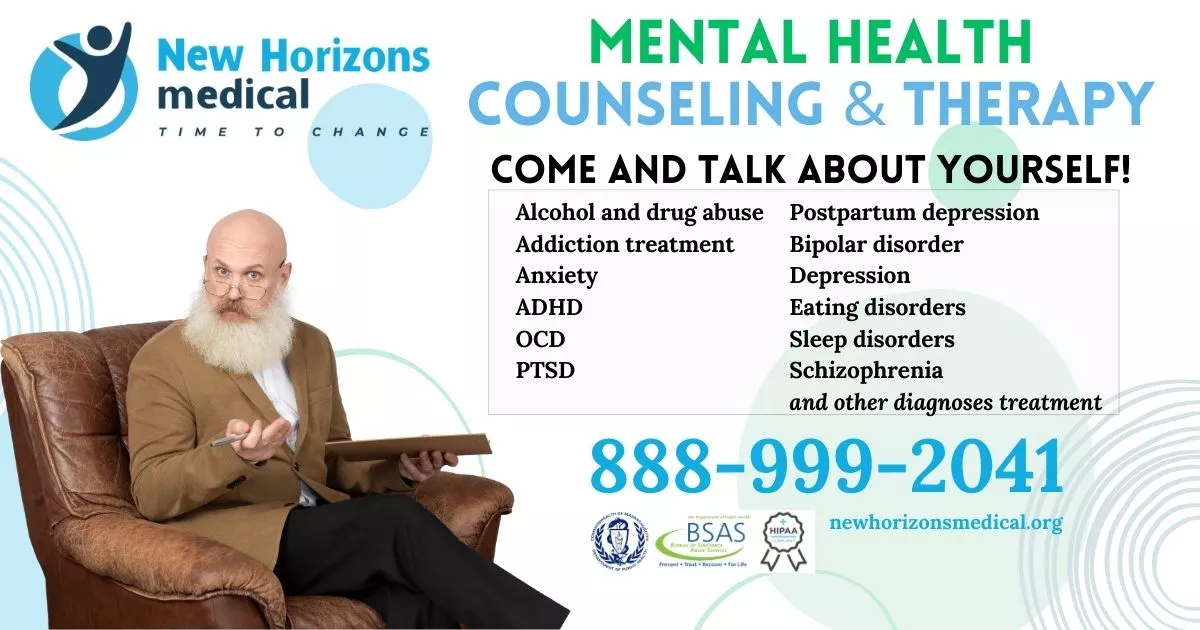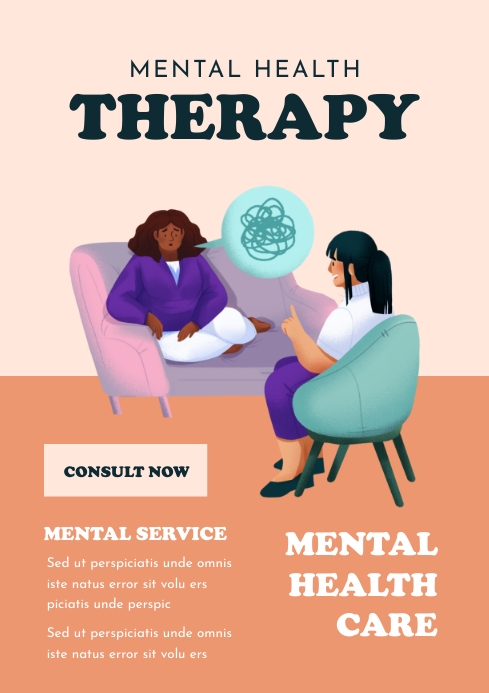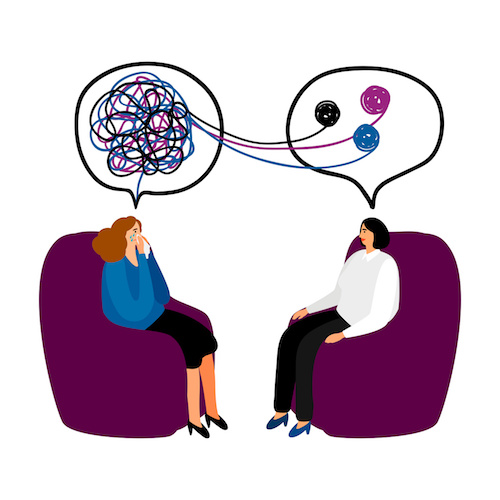Cognitive Behavioural Therapy vs. Other Therapies: What Makes It Unique?
Wiki Article
Unlocking the Tricks of Mental Health And Wellness: A Summary of Counseling and Therapy Alternatives
Mental health is a facility and crucial aspect of overall well-being. Numerous therapy and treatment alternatives exist to resolve various psychological challenges. Each approach supplies one-of-a-kind benefits and methods tailored to specific needs. Comprehending these alternatives is vital for any person seeking to boost their psychological health. Mental Health Resources. What variables should one consider when discovering these avenues? The answer might disclose a course to a much healthier psychological stateRecognizing Mental Wellness and Its Significance
Psychological wellness includes the emotional, mental, and social well-being of people, significantly affecting how they assume, really feel, and act. Its significance can not be overstated, as it impacts every element of life, including partnerships, work performance, and general lifestyle. Individuals with excellent mental health often tend to deal with tension extra effectively, maintain much healthier relationships, and make notified choices. Alternatively, poor mental health can result in psychological distress, damaged functioning, and numerous mental illness, which may need expert treatment. Understanding mental health and wellness is crucial for recognizing the indications of distress and the demand for assistance. Understanding also promotes compassion and lowers stigma, urging individuals to seek help when necessary. By prioritizing psychological health, neighborhoods can promote settings that support emotional wellness, ultimately resulting in healthier, a lot more resilient individuals. This structure offers as a critical step toward effective psychological health counseling and therapy alternatives.
Kinds Of Counseling Techniques
Therapy strategies differ widely, each tailored to satisfy the unique needs of individuals seeking support. Amongst the most common types are cognitive-behavioral treatment (CBT), which concentrates on recognizing and changing negative idea patterns, and person-centered treatment, which emphasizes compassion and approval. Psychodynamic treatment explores unconscious processes and previous experiences to understand current habits, while solution-focused short therapy aims to identify services as opposed to examine problems.Additionally, household treatment addresses relational dynamics and communication within family members, cultivating much healthier communications. Team therapy offers a common space for participants to share experiences and support one another. Other techniques include existential therapy, which encourages people to discover significance and purpose, and art or songs treatment, which utilizes innovative expression as a healing tool. Each technique uses distinctive techniques and philosophies, enabling clients to discover the most ideal technique for their personal growth and recovery journeys.Exploring Various Treatment Modalities
In the domain of psychological health and wellness counseling, numerous therapy modalities provide distinct strategies to treatment. Cognitive Behavioral Therapy stresses the connection in between behaviors and ideas, while Psychodynamic Therapy discovers subconscious influences on psychological well-being. Furthermore, Mindfulness-Based Techniques promote present-moment understanding as a way to improve emotional policy and total psychological health and wellness.Cognitive Behavior Modification
Cognitive Behavior Treatment (CBT) stands apart as one of the most extensively practiced and researched techniques in psychological health therapy. This technique focuses on the interconnection in between behaviors, ideas, and sensations, emphasizing that changing negative idea patterns can lead to boosted psychological health and behavioral changes. CBT is structured, commonly including a restricted number of sessions, and aims to gear up people with sensible skills to handle their signs. It works for a variety of problems, including anxiety disorders, clinical depression, and post-traumatic tension condition. By using methods such as cognitive restructuring and exposure treatment, CBT promotes strength and encourages customers to challenge difficulties head-on, making it a valuable option in the landscape of mental health therapies.Psychodynamic Treatment Strategies
Psychodynamic treatment strategies supply a deep expedition of the unconscious mind and its influence on behavior and emotional wellness. Rooted in Freudian theory, these methods stress the significance of early childhood years experiences and unconscious disputes. With techniques such as complimentary organization, desire evaluation, and transference, people get understanding into their thoughts and feelings, fostering self-awareness and understanding. This restorative modality motivates customers to uncover quelched emotions and unsolved issues, which can be essential in attending to present mental difficulties. By taking a look at the interaction between previous experiences and existing behaviors, psychodynamic therapy aims to promote psychological healing and personal growth. Eventually, it gives a structure for individuals to explore intricate inner dynamics that influence their mental wellness.
Mindfulness-Based Methods
While standard therapies commonly focus on past experiences, mindfulness-based methods prioritize present-moment understanding as a pathway to emotional health. These techniques, including mindfulness-based cognitive therapy (MBCT) and mindfulness-based stress reduction (MBSR), encourage individuals to engage fully with their ideas and sensations without judgment. Specialists find out to observe their psychological states, promoting a better understanding of psychological triggers and reactions. This practice not just relieves signs of anxiousness and depression yet likewise enhances general mental durability. By integrating mindfulness workouts, such as reflection and deep breathing, customers grow a feeling of tranquility and clarity. Eventually, mindfulness-based techniques empower individuals to browse life's challenges with increased awareness and approval, promoting a healthier partnership with their feelings and ideas.The Role of a Therapist or Therapist
A competent specialist or therapist plays an important duty in sustaining individuals with their mental wellness journeys. They offer a risk-free, non-judgmental area where customers can share their ideas and feelings honestly. Marriage Counselling. By using various restorative techniques customized to each individual's requirements, specialists help clients explore underlying concerns that may add to their mental health and wellness challenges.Therapists use advice and tools to handle tension, anxiety, depression, and various other emotional problems. Their training outfits them to recognize patterns in actions and thought procedures, facilitating understandings that bring about individual development. They likewise cultivate a solid healing partnership, which is essential for successful outcomes.Moreover, specialists continue to be dedicated to privacy and moral requirements, guaranteeing a relying on setting. Eventually, the role of a specialist or counselor is to empower people, urging them to create durability and healthier coping strategies while guiding via life's intricaciesExactly how to Pick the Right Counseling or Therapy Choice
Selecting the ideal therapy or therapy option starts with examining private requirements. It is important to understand individual difficulties and goals prior to exploring various therapy designs. This foundational action can significantly influence the efficiency of the selected method.Analyze Your Needs
How can people effectively assess their psychological health and wellness needs when evaluating therapy or therapy options? Initially, they must review their psychological state and determine specific issues, such as anxiety, clinical depression, or relationship obstacles. Journaling can be a helpful device for tracking ideas and feelings with time. In addition, people might benefit from seeking comments from relied on buddies or member of the family regarding perceived modifications in behavior or state of mind. It is also practical to review individual goals for therapy, such as enhancing coping abilities or obtaining understanding into individual patterns. Finally, researching different counseling modalities and their suitability for certain requirements can assist in making an informed option. Ultimately, self-awareness plays a pivotal duty in choosing the ideal path for psychological wellness assistance.
Discover Treatment Styles
While traversing the varied landscape of therapy options, people should think about various styles of counseling to locate the most effective suitable for their one-of-a-kind requirements. Cognitive Behavioral Therapy (CBT) concentrates on altering negative thought patterns, while Psychodynamic Treatment checks out unconscious processes and past investigate this site experiences. Humanistic strategies emphasize individual development and self-actualization, promoting a supportive setting. In addition, mindfulness-based therapies grow present-moment recognition, aiding emotional law. For those seeking structure, Solution-Focused Quick Treatment targets specific objectives and options. Team treatment provides a public setup for shared experiences and assistance. Ultimately, individuals ought to review their choices, convenience levels, and particular obstacles, guaranteeing they choose a restorative style that resonates with their individual trip toward mental wellness.Conquering Barriers to Looking For Help

The Benefits of Counseling and Therapy for Mental Wellness
Looking for assistance for psychological health challenges can result in significant renovations in overall well-being. Therapy and treatment give individuals with a risk-free area to discover their sensations and thoughts, cultivating self-awareness and individual development. These professional services gear up clients with coping approaches and problem-solving skills customized to their special situations.Moreover, therapy can decrease symptoms of anxiety, clinical depression, and other mental wellness conditions, enhancing psychological strength. Normal sessions promote accountability and urge people to set and attain individual goals. Through numerous healing techniques, such as cognitive-behavioral therapy or mindfulness practices, clients learn to reframe adverse thoughts and establish healthier behaviors.Additionally, the therapeutic relationship itself can be a resource of assistance, helping to battle seclusion and isolation. On the whole, taking part in counseling and treatment is a proactive step toward attaining mental health, allowing people to lead more meeting lives.Frequently Asked Inquiries
The Length Of Time Does Therapy or Therapy Typically Last?
The informative post period of therapy or treatment varies considerably, often lasting from a couple of sessions to a number of months or years. Elements affecting this consist of the person's certain requirements, the type of therapy, and restorative objectives.What Should I Anticipate During My Initial Session?
During the first session, people can anticipate an intro, conversation of worries, and the therapist's method. They may finish analyses and establish goals, cultivating a secure setting for open interaction and structure relationship.
Are There Any Dangers Connected With Treatment?
Therapy can involve risks, such as psychological discomfort, vulnerability, or facing uncomfortable memories. While these difficulties may emerge, they can likewise lead to personal growth and recovery, making the therapeutic procedure complex yet possibly gratifying.How Can I Inform if My Therapist Is a Great Fit?
Identifying if a therapist is a good fit involves evaluating convenience, interaction style, and restorative method. Positive relationship and progression towards objectives are signs of an appropriate match, essential for reliable psychological health and wellness support.Will My Insurance Cover Counseling or Treatment Sessions?
Figuring out insurance policy coverage for therapy or treatment sessions typically requires speaking to the insurance policy service provider directly. Plans differ considerably, so individuals need to verify advantages, co-pays, and any type of required pre-approvals before going after therapy services. Amongst the most common types are cognitive-behavioral treatment (CBT), which concentrates on recognizing and changing adverse thought patterns, and person-centered treatment, which highlights compassion and approval. Psychodynamic treatment discovers unconscious processes and past experiences to recognize existing actions, while solution-focused brief therapy aims to identify services rather than examine problems.Additionally, family members treatment addresses relational dynamics and interaction within family members, fostering much healthier interactions. Other strategies include existential therapy, which urges individuals to locate meaning and function, and art or songs therapy, which uses imaginative expression as a restorative device. Cognitive Behavioral Therapy emphasizes the link between thoughts and behaviors, while Psychodynamic Treatment checks out unconscious influences on psychological well-being. Cognitive Behavioral Therapy (CBT) focuses on changing adverse thought patterns, while Psychodynamic Treatment discovers unconscious processes and previous experiences.Report this wiki page